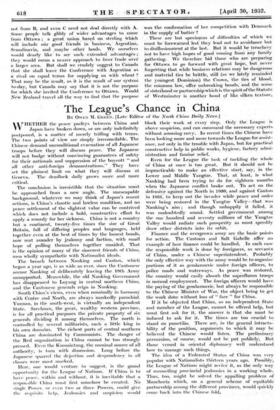Chance in China The League's _
By OWEN M. GREEN. [Late Edito
r of the North ChinO Daily News.]
WDETHER the peace parleys between China and Japan have broken down, or are only indefinitely postponed, is a matter of merely trifling with terms. The two points of view are simply irreconcilable, The Chinese demand unconditional evacuation of all Japanese troops before they will discuss peace. The Japanese will not budge without convincing guarantees of safety for their nationals and suppression of the boycott " and all other anti-foreign demonstrations." . They have Set the plainest limit on what they will discuss at Geneva. The deadlock daily grows more and more critical.
The conclusion is irresistible that the situation must be approached from a .new angle. The uneseapable background, whatever we may think of Japan's recent actions, is China's chaotic and lawless condition; and no -peace settlement of the slightest value can be contrived which does not include a bold, constructive effort to apply a remedy for her sickriesS. China is not a country but a continent, twenty-five times the size of Great Britain, full of differing peoples and languages, held together even at the best of times by the loosest bonds, now rent asunder by jealousy and faction, with small hope of pulling themselves together unaided. That is the Opinion of many of the sincerest friends of China; men wholly sympathetic with Nationalist ideals. •
The breach between Nanking and Canton; which began a year ago; is as wide as ever, since the Cantonese accuse Nanking of deliberately leaving the 19th Army unsupported. Meanwhile, the old Nanking Government has disappeared to Loyang in central northern China; and the Cantonese generals reign in Nanking.
South China's views, even when nominally in harmony with Centre and North, arc always 'inarkedly parochial. Yunnan, in the south-west, is virtually .an independent State. Szechuan; the great, wealthy western province, is for all practical purposes the private property of siX generals dividing it among themselves. The north is controlled by several militarists; each a little king in his own domains. The richest parts of central southern China are dominated by Communists. The danger of I he Red organization in China cannot be too strongly pressed. Even the Kuomintang, the nominal source of all authority, is torn with dissension. Long before the Japanese quarrel the dejection and despondency in all classes were most marked.
Here, one would venture to suggest, is the grand opportunity for the League of Nations. If China is to have peaec, within and without, it is inevitable that a responsible China must first somehow be created. No single Power, or even two or three Powers, could give the requisite help. Jealousie4 and suspicion would block their work at every step. . Only the. League is above suspicion, and can command the necessary experts without arousing envy. In recent times the Chinese have been looking more and more towards the League for .assist- slice, not only in the trouble with Japan, but for practical constructive help in public works; hygiene, factory admi- nistration and famine Even for the League the task of tackling the whole of China at once is too great, But it should not be impracticable to make an effective start, say; in the Lower and Middle Yangtze. That, at least, is what Nanking had been trying to de for eighteen months when the _Japanese conflict broke out. To act on the defensiVe against the North in 1930, and against Canton in 1931, to keep out the invader while peace and order were being restored in the Yangtze Valley—that was Nanking's aim ; and though unhappily it failed, it was undoubtedly sound. Settled government among the one -Irundred 'and seventy millions of the _Yangtze Valley would radiate such prosperity as must speedily draw other districts into its orbit.
- Finance and the overgrown army arc the basic points for action. The Customs and Salt Gabelle offer an example of how finance could be handled. In each case the responsible work is done by foreigners, as servants Of China, under a Chinese superintendent, Probably the only effective way with the army would be to organize portions of it as gendarmerie under foreign officers; to police roads and waterways. As peace was restored, the country would easily absorb the superfluous troops in normal employment. ' The foreign officers would have the paying of the gendarmerie, but alwaYS be responsible to the Chinese Minister of War, the object being to get the work done without loss of " face " for China. If it be objected that China, as an independent State and member of the League, cannot be offered help, but must first ask for it, the answer is that she must be
induced to ask for -it. The times are crucial to stand on punctilio. There are, in the general intracta- bility of the position, argAiments to which it may be believed the Chinese would listen. The preliminary persmiSion, of course, would not be put publicly. Bat those versed in oriental diplomacy well understand how to manage such things.
The idea of a Federated States of China was very popular with Nationalists thirteen years ago. Possibly, the League of Nations might revive it, as the only way of reconciling provincial jealousies iii a working whole. Thus, too, might be solved the appalling problem of Manchuria which, on a general scheme of equitable partnership among the different provinces, would quickly come hack into. the Chinese fold.






































 Previous page
Previous page